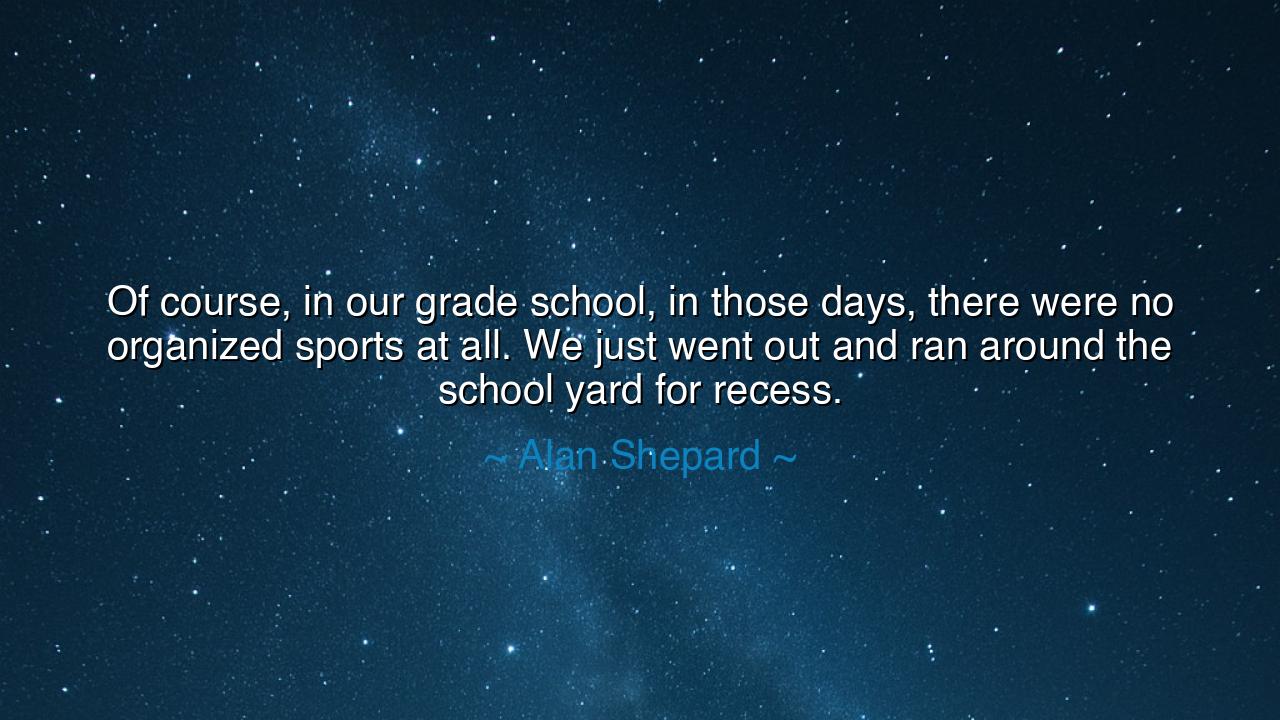
Of course, in our grade school, in those days, there were no
Of course, in our grade school, in those days, there were no organized sports at all. We just went out and ran around the school yard for recess.






The words of Alan Shepard, the first American to journey into the heavens, are humble and disarming: “Of course, in our grade school, in those days, there were no organized sports at all. We just went out and ran around the school yard for recess.” In this memory lies a simple picture, yet beneath it, a profound truth: that greatness is not always forged in grand arenas or polished programs, but in the unstructured play of childhood, in the freedom of imagination, and in the raw joy of running for its own sake.
Shepard, who would one day look down upon the earth from the silence of space, began not in the ordered training grounds of academies, but in the dust and laughter of a school yard. He reminds us that discipline, curiosity, and endurance often spring from small beginnings. The ancients too understood this: that the heroes of the future are shaped not only by formal drills, but by the unguarded, unplanned contests of youth, when boys and girls run freely under the open sky.
Consider the story of the young Alexander the Great. Before he became conqueror of empires, he ran and wrestled with his companions in the palace courtyards of Pella. It was not the formal sports of Olympia alone that shaped him, but the restless games of youth, where spirit and daring grew without the confines of rules. So too with Shepard: in those unstructured moments of recess, a spirit of energy and exploration was kindled, a spirit that would one day lift him from playground dust to celestial glory.
This quote also reveals the humility of an age when life was simpler. Today, children are often pressed into structured leagues, organized practices, and carefully measured competitions. Yet Shepard’s words remind us of another path: the strength of unscripted play, the creativity of freedom, the endurance gained not from coaches but from running until one’s breath burned. From such beginnings, resilience was born. From such unorganized games arose a man who would train his body and mind to withstand the crushing force of rocket launches and the silence of the stars.
The deeper meaning here is that greatness grows from unexpected soil. Do not believe that you must always have the perfect conditions, the finest training, or the most organized path. The school yard itself can be a proving ground. The smallest experiences, taken seriously, may prepare you for unimaginable journeys. The boy who once ran at recess without rules became the astronaut who raced among the heavens. Such is the mystery of preparation: what seems trivial in the moment may prove mighty in destiny.
The lesson for us, then, is this: do not despise small beginnings. Whether in childhood games, in humble work, or in overlooked duties, there lies the seed of greatness. Do not wait for perfect order before beginning; run with what you have, where you are. Embrace freedom, embrace the joy of striving, for it is this spirit—not the structure alone—that will carry you forward when life’s greater tests arrive.
Practically, seek both discipline and play. Let your children, or your own soul, have moments of unstructured energy, where imagination and endurance may flourish. Do not bind yourself only to formalities; remember that the true shaping of character comes from both freedom and structure. When life seems too small, too ordinary, recall Shepard’s memory: that the one who once ran circles in the dust of a school yard would one day walk upon the moonlit stage of history.
So take this wisdom to heart: run where you can, play where you may, embrace the small joys of today, for you know not what future greatness they prepare you for. The path to the stars often begins in the laughter of the playground.






AAdministratorAdministrator
Welcome, honored guests. Please leave a comment, we will respond soon